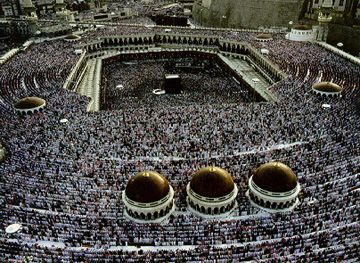The Five Pillars of Islam
All Muslim beliefs rest on what are called the Five Pillars, or obligations, which uphold the very structure of Islam. Their practice is essential. Here they are, with their Arabic names:
- tashahhud, the profession of unity. “There is no god but God, and Muhammad is the Messenger of God.” Called the shahada, or “witnessing,” this is the keystone of Islamic belief, and it is sometimes said that the earnest profession of this spiritual commitment is enough to make one a Muslim. However, unless one follows the other four “pillars,” especially the daily prayers, one may be considered to have forsaken Islam.
- salat, the five-times-daily prayer. Performed just before dawn, just after noon, in midafternoon, just after sunset, and after nightfall, the prayers are preceded by ritual ablutions with water, and consist of a strictly prescribed series of postures. The raka, or cycle of prayer, which has not changed since the dawn of Islam, begins with the phrase Allahu Akbar (“God is greater” than human conception) followed by a short prayer of praise, then the Fatihah and the word Amin (“so be it,” equivalent to the Hebrew Amen). While reciting other prayers, worshipers lower their palms to their knees and bow the head, straighten up again, prostrate themselves on toes, knees, palms, and forehead, and return to a sitting position, hands on knees for the final prayer. The number of requisite rakas varies from two to four depending on the time of day.
- zakat, the compulsory annual charity Traditionally one-fortieth of a person’s income, zakat is distinct from the duty of giving alms (sadaqa) on a spot basis to those in need (Muslim tradition insists that one should never refuse a beggar). The zakat is spent to help needy members of the Muslim community, for debtors and travelers, and to win converts to Islam. In the early days of Islam, since the zakat was not applied to the poor it amounted to a progressive tax, not merely on income (like the Jewish and Christian tithe) but on all assets. However, the zakat as a civil code is now virtually extinct, having been replaced by modern tax codes. It is a voluntary yet highly respected form of offering, often to the local mosque.
- sawm, the fast from before sunrise to sunset each day for the full lunar month of Ramadan, the ninth month of the Muslim calendar. Ramadan may last 29 or 30 days depending on the cycle of the moon, and shifts earlier each year by eleven days, so that over 33 years it traverses all the different seasons. This time-shift affects the hardship connected with the fast; during long, hot summer days, to go without food or water is no easy matter. The fast covers food, drink, medicine, tobacco, and sexual intercourse; believers should hear or recite the entire Quran at least once during the course of the month. The proscriptions are lifted from sundown to dawn, and the breaking of the fast each evening and during the month should be a joyous occasion. A three-day festival takes place at the end of the month, as at the end of the month for pilgrimage. These are the two major holy festivals of Islam, and because of the Muslim lunar calendar they are not associated with a particular season, as with, say, Christmas or Passover. Children, pregnant or nursing mothers, the ill, travelers, and those involved in warfare are not obliged to fast.
- hajj, the pilgrimage to the Kaaba in Mecca

Expected of every healthy and solvent adult at least once in a lifetime, except for those who cannot afford the expense of the trip or of supporting their families while away. They may contribute what they can to the expenses of a substitute who represents a number of would-be pilgrims. Aside from its devotional aspects, hajj also causes Muslims of all races, colors, nations, and economic brackets to meet on an equal basis, stripped of the accoutrements of class and status.
Other less formal but nonetheless commonly observed rules regarding diet clearly have a Biblical resonance. Eating pork or the blood of slaughtered animals is forbidden; animals must be slaughtered by cutting their throats while saying a blessing, as in Jewish law. The prohibition against alcohol is more strictly enforced in fundamentalist countries like Saudi Arabia than elsewhere in the Muslim world, but it is generally respected by serious Muslims. Circumcision is widely practiced, although it is not mentioned in the Quran, only in hadith.
Growing out of Islam’s struggles against idolaters, the use of pictorial images of God, Muhammad, the caliphs, or anyone at all is technically forbidden, although it is strictly enforced only in mosques. Islamic art does occasionally portray the Prophet and other Muslim notables, but by European and Asian standards, their appearance is relatively rare. Instead, Muslim artists have developed to a high art calligraphy, arabesque, and decorative abstracts using floral designs. Caligraphic icons of Quranic verses and the names of Muhammad and the caliphs are commonly found in both homes and mosques.
Islamic Law
The term for the entire spiritual law of Islam sharia, encompassing not only the Five Pillars, but also sunna, or “custom” — the sayings and practices of Muhammad as contained in the most authoritative hadiths — and the revealed word of the Quran. The counterpart of the external law of the sharia is the inner, spiritual reality, or haqiqa. The esoteric path of the mystics is known as the tariqa; by extension, tariqa can refer to a Sufi mystical order.


